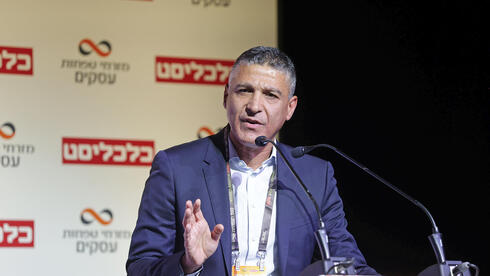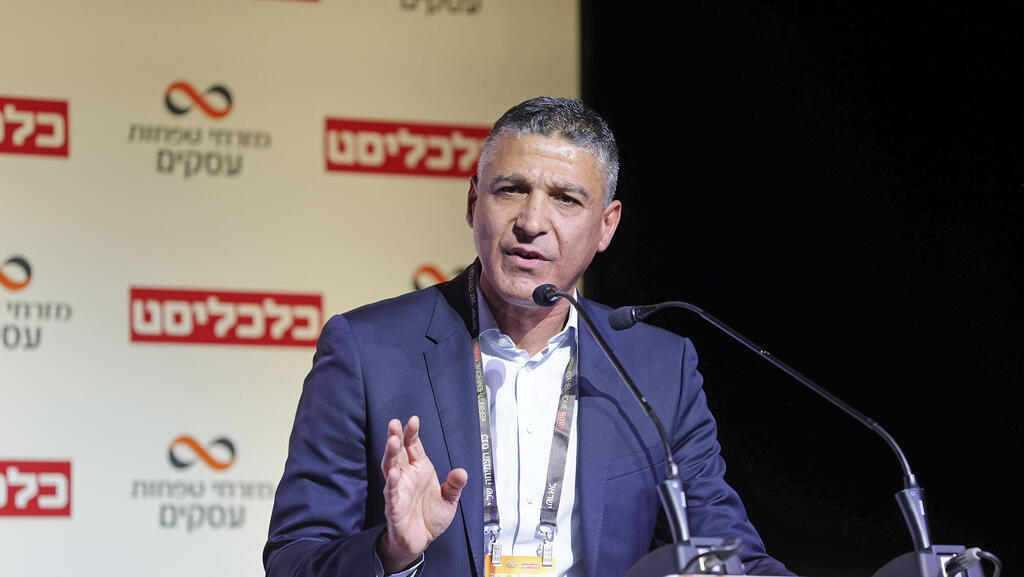
"We are at the most dangerous economic juncture for Israel since its founding"
The CEO of Mizrahi Tefahot Bank, Moshe Larry, made these statements at the growth conference of Calcalist and Mizrahi Tefahot. He called for brave decisions to be made in light of Israel's economic situation against the backdrop of the war, including raising taxes and reducing expenses, and avoiding the allocation of coalition and sectoral funds.
"We are at the most dangerous economic juncture for Israel since its founding," said Moshe Larry, the CEO of Mizrahi Tefahot Bank on Wednesday at the Calcalist and Mizrahi Tefahot growth conference. Larry also mentioned that brave decisions are required despite the political costs, including raising taxes, reducing expenses, and allocating resources efficiently and correctly, rather than to coalition and sectoral funds.
"On the one hand, the Israeli economy is remarkable. When you look at the indicators, you see recovering growth, increasing private consumption, decreasing unemployment, and a certain recovery in the real estate market," Larry said. "The economy shows resilience despite the war, but when you look a little further, you can certainly see the clouds darkening over the Israeli economy."
He noted, "There are negative indicators that cannot be ignored: the lowering of the rating forecast, Israel's risk premium at its peak, and an exodus of foreign investors, along with apparent economic boycotts—something we have not known before. You then ask yourself what is going on here. We are at critical moments for Israel's economic strength, and the question now is which direction we will take from here."
"There is a general human tendency, particularly among Israelis, to assume that everything will be fine," said Larry. "Precisely now, we must not err in the economic assumption that everything will be fine. If we take the wrong turn, we will pay a huge price for this economic mistake."
Larry compared Israel to other countries and said, "There is no economy in the world quite like Israel's; we are unique in many ways. Still, I tried hard to find an example of an economy that experienced a similar reality. I found Ukraine, which has been at war for two years. We see normality there, and we will probably find these kinds of conferences, but the GDP has shrunk by about 13%, the debt-to-GDP ratio has exceeded 50%, and the population has dropped significantly from 40 million to 36 million—a decrease of 12%. Those who left are mainly those who can, the strong and productive population. Will foreign investments come to Ukraine in this situation? Is there a future for the younger generation there?"
He added, "If we return to Israel’s crossroads, we will need to make courageous decisions, from the right place and not the comfortable one. The truth is that any government, current or future, must define an action plan, a fiscal plan with several pillars:
"A good debt-to-GDP ratio is 60%, and there were years when Israel's economy was there. Today, we are already a little over 70%. Policymakers must define that the debt-to-GDP ratio should be lower than 68%, with a goal of 60%.
"The optimists will say that the deficit will be 6% and the pessimists 8%; the truth will probably be in the middle. We need to set a goal for the next two years of less than 4%. Debt needs to be paid back, and today's debt is expensive. We must reduce this deficit, created by two vectors: expenses and revenues. Some expenses have increased because of the war. Regarding revenues, it should be said plainly—yes, there will be tax increases."
Regarding taxes, Larry emphasized that it is important the increases do not burden the same population that already bears the economic, productive, civil, and now also the security burdens.
According to Larry, "I am convinced there are expenses that can be cut. But the more important thing is to allocate funds to the right places. Enough with coalition funds and sectoral funds. It's time for the funds to go to growth-oriented areas like transportation, high-tech, and education. We must bring the periphery closer to the center. Another crucial aspect is integrating the ultra-Orthodox society into the employment circle and the shared burden. The High Court ruling is not against the Torah but in favor of society. I hope the ultra-Orthodox community understands that a sharp change is required to achieve equality in burden, education, and employment."
Larry concluded on an optimistic note: "Is it possible to achieve a victorious outcome? Certainly yes, but we must take the smart turn. Civil society has proven itself and demonstrated tremendous power. It can and wants to return to a path of rapid and renewed growth. Therefore, the audience representing private businesses has a key role. They are the reserve soldiers of the Israeli economy."















